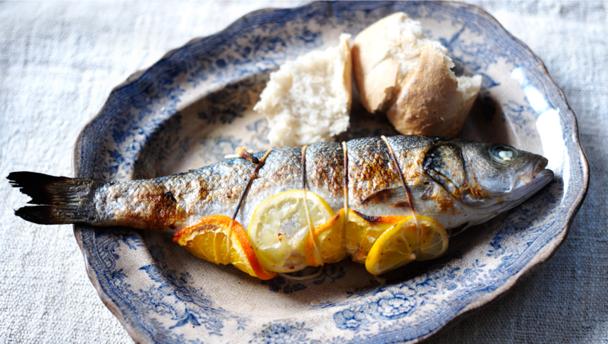

By Jo' Pratt
Fish are aquatic animals: different species can be found in both fresh and saltwater. Some species of fish have been farmed for their meat via aquaculture; others are caught in the wild. All fish are excellent sources of protein, vitamins and minerals.
 Steamed Cantonese-style fish
Steamed Cantonese-style fish
 Fishcakes
Fishcakes
 How to make fish soup
How to make fish soup
When buying fresh fish there are a few pointers to look for. With whole fish the eyes should be bright and clear, not sunken or dry. Inside the gills should be vivid pink or red, not a dull brown. The skin should be vibrant and shiny and the flesh firm. Fillets or steaks of fish should be firm and translucent, without discolouration. Smell is also an excellent indicator of the freshness of a fish - it should smell of nothing but the sea. A fishy smell is a clear sign that the fish is past its best.
Frozen fish can be just as good, if not better, than all but the very freshest fish. Because it's often frozen quickly, it has less time to deteriorate than 'fresh' fish, which may be several days old by the time you buy it.
It's worth going to the trouble of finding a good fishmonger in your area, even if it's a bit of a trek, as there's no substitute for really fresh fish.
Farmers' markets or reputable street markets can also be a good source of fresh fish. Good fishmongers will be happy to fillet a fish for you; remember to ask for the bones, head and skin as they make great stock.
Sustainability' is an important buzz word for the consumer with a conscience, as stocks of certain popular fish, such as cod and haddock, have been severely depleted by overfishing. Buy your fish from reputable fishmongers and keep asking the question: "Is this fish responsibly fished and from a sustainable source?". If you're buying fish from a supermarket, look out for the blue Marine Stewardship Council (MSC) logo that guarantees that the fish comes from a sustainable source.
Fresh fish is best eaten as soon after catching or buying as possible. At a push, it will keep in the fridge for 3-4 days but will lose its freshness. Wrap it well in wax paper or seal it in a freezer bag and do not store it above or with fresh foods. Fish can be wrapped and frozen for up to three months. However, if you buy it frozen, it's unwise to refreeze it: instead, cook it as part of a recipe, then freeze.
Fish can be prepared in countless ways. Poach, steam, pan-fry, deep-fry, roast, braise, grill or barbecue it; stuff it with herbs, breadcrumbs or other fish; serve it with a sauce or stew; or preserve it by drying, salting, hot-smoking or cold-smoking it. Sushi-grade fish, when specially prepared, can also be eaten raw.
Type the ingredients you want to use, then click Go. For better results you can use quotation marks around phrases (e.g. "chicken breast"). Alternatively you can search by chef, programme, cuisine, diet, or dish (e.g. Lasagne).